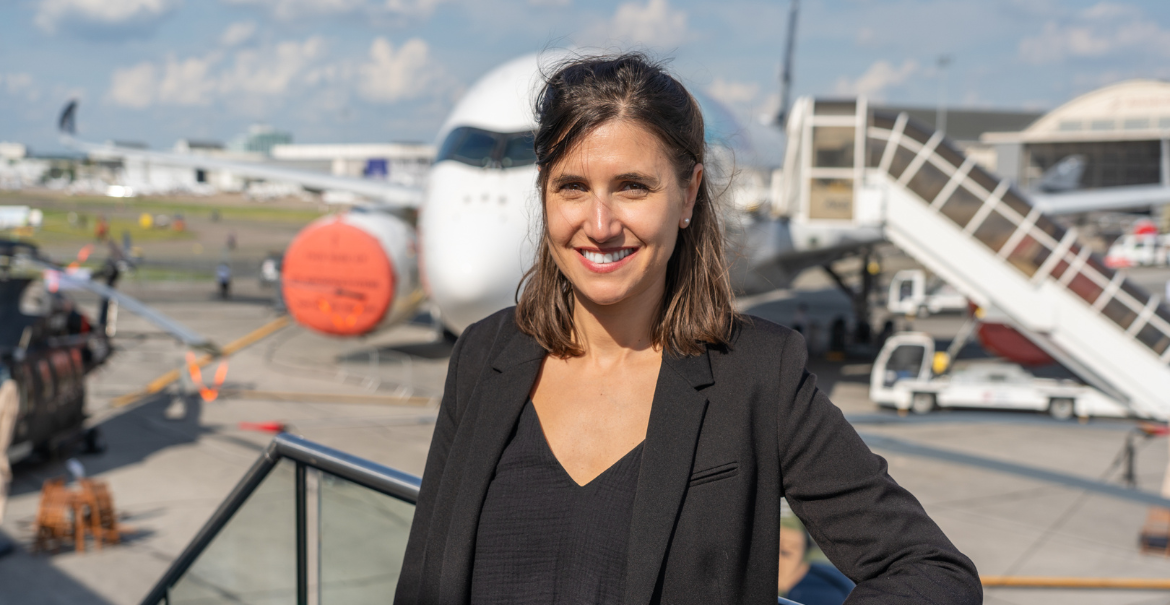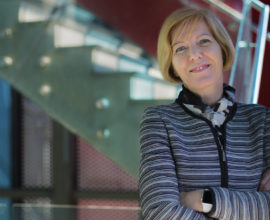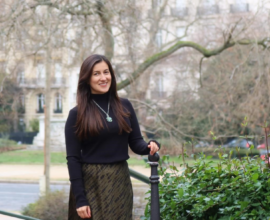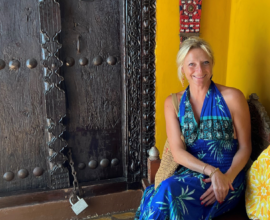Elisabeth Gautier
Elisabeth and her thirst for learning
![]() Reading Time: 12 minutes
Reading Time: 12 minutes
Head of Technology, Engineering and Product Decarbonisation Communication – Airbus
A spirit of curiosity. This is the most befitting qualifier to describe 38-year-old Elisabeth Gautier. A former 2009 graduate of the Audencia Grande Ecole Programme, this young woman would hold various posts at Airbus before finding the one that suited her down to the ground. Her rich career path has enabled her to gain a wealth of experience, both in France and abroad, across a wide range of sectors including communication, purchasing, finance, and more.
Today, Elisabeth is the “Head of Technology, Engineering and Product Decarbonisation Communication” for the large aerospace corporation, and has become an executive manager. This status entails a heavy workload. However, as the mother of two young girls, she is keen to protect her family and set aside time to unwind, which she does through meditation and hiking.
What made you decide to follow preparatory classes to enter the Grand Ecole study path?
My initial career choice was to become an architect. However, after carrying out a work placement at an architecture firm in Year 10, I gave up on the idea. I came to realise that when it comes to constructing a building, the engineers have more of a say than the architect. The profession turned out to be less creative than I initially thought. Following this, my sights were set on becoming an engineer. I like understanding how the things around me work. I am a very curious person. Equally, I wanted to go out and discover the world. In the end, I opted for preparatory classes followed up by a business school; this proved a good fit in terms of my thirst for knowledge, my wish to study a diverse range of subjects, and my desire to gain international experience.
What do you feel you gained from your years spent at Audencia?
Audencia, is a school which opens up a lot of opportunities to its students, both academically and on an associative and international level. What’s more, I took full advantage of this potential by getting involved in the sports centre and the FiNantes association (an investment club), as well as participating in some of the junior enterprise schemes. Moreover, I followed the “Action For Sustainable Business” study course, enabling you, in around 60 hours, to grasp the issues related to climate and environmental change, and implement innovative initiatives at all levels of a company’s value chain. I went on two international exchanges, one of which was in Chili even though I didn’t speak Spanish back then. Indeed, I have very fond memories of my internships. The first one, I carried out in Nepal in fairtrade, where I conducted audits for smallholder farmers’ cooperatives. Then, I did marketing for a company and some consultancy work in Paris, as well as finance in New York. So, this was a very prosperous period, as indeed it was on a personal level too. It was during this time that I met my future husband and formed a lot of friendships, many of which I still have today.
Our study years enabled us to forge strong bonds with each other, as we all have many great shared experiences, mainly through club-based activities. This served to bring us a lot closer together.
As part of your studies, you decided to pursue a master’s degree in “International Strategic Management and Consulting.” So, why this choice in particular?
After the Grande Ecole Programme, I still didn’t know what I wanted to go into. This might explain the wide variety in my choice of my internships; I like to test things out to see if they hit the spot. There are however a few key considerations: my liking for an international dimension and for a diversity of roles that allow me to keep learning new things. The master’s degree provided me a way to bring to the fore the sectors I had previously been involved in: marketing, finance, etc. This all came together with my consultancy work, that I had enjoyed testing out during the junior enterprise schemes. Following my master’s degree, I did an internship in this field as part of a “knowledge management” startup. Could this be my path? I wasn’t entirely sure, however my instinct told me to lean into it. In the end, I didn’t find this experience to be all that inspiring. My assignments mainly consisted of PowerPoint presentations, along with a massive workload and an unpleasant atmosphere. Therefore, I decided to attempt another adventure, that of becoming a buyer in a purchasing centre for the BUT and Conforama stores, located in the French overseas departments and territories. This permanent contract proved particularly varied and opened other avenues for me, adding to my skill set ‘purchasing,’ marketing and management, which I certainly got a lot out of. In terms of these aspects of the job, I doubted my legitimacy, but as the saying goes, “fake it till you make it.” And it worked! I learned a great deal and got to enjoy myself in the process, yet, with the limited promotion prospects on offer, I preferred to leave my post. In parallel, I got a place on a graduate programme with Airbus.
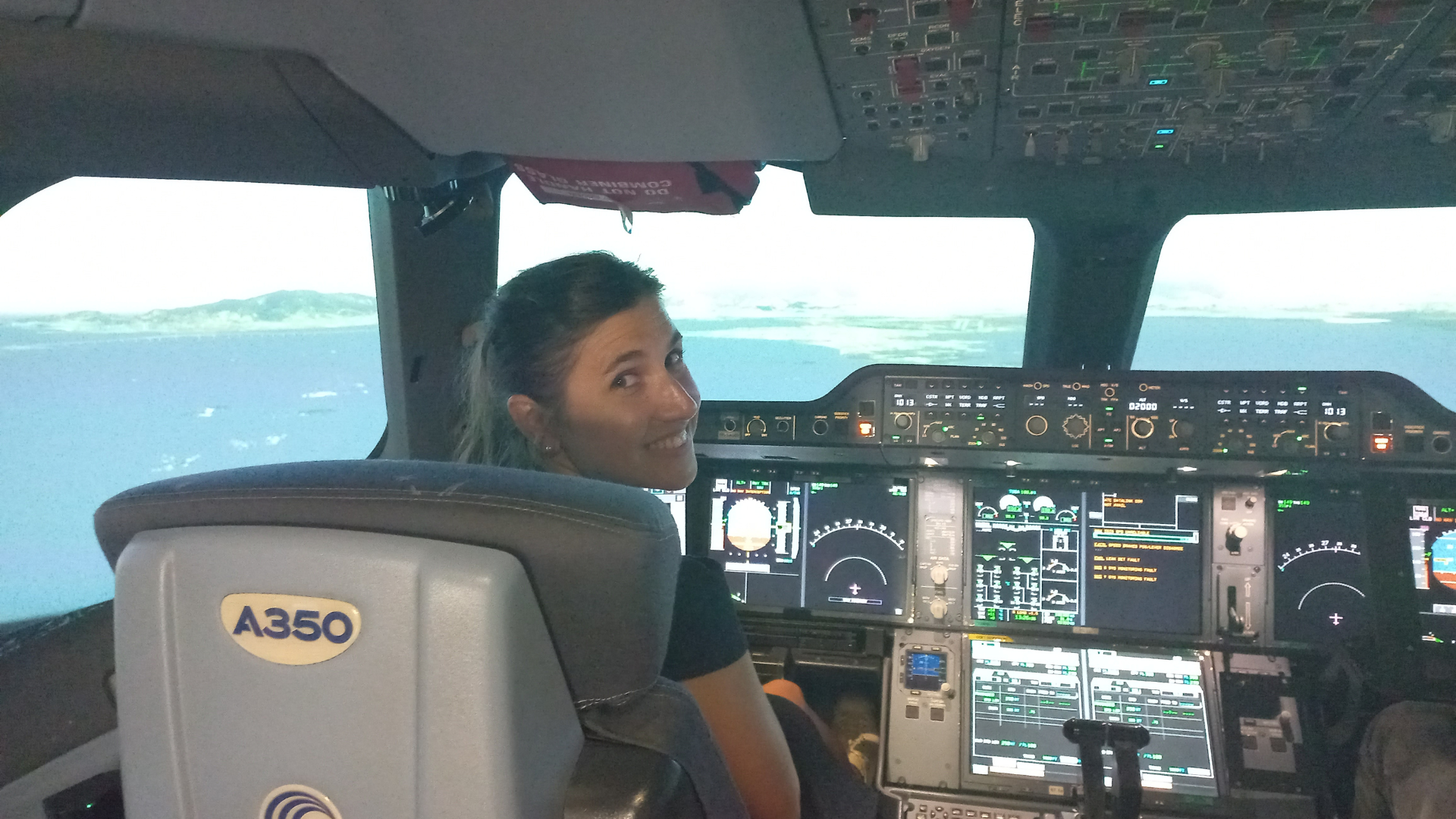
What did this graduate programme involve?
It has a class-year intake of some 60 to 70 individuals, recruited from right across the world, according to certain criteria: having held a professional post abroad for at least two years and having less than five years’ professional experience. For my part, what appealed most was the company itself; Airbus, is a symbol of Franco-German cooperation -I studied German- hence making it a company with an international focus. This is a 5-year programme, during which you change at least three times your job position, your division (commercial aircraft, helicopters, space, and defence), and your country. The management “training” side (building a team, knowing how to give feedback successfully, learning to negotiate, having tough discussions, understanding intercultural differences, etc.,) is also a substantial part of this. Having benefitted from the excellent teaching delivered at Audencia, this was not the most interesting part of the programme for me. So, I focused on the technical side (commercial aircraft). It is up to us to build our own career path – we sign a permanent contract at the start – and we are required to find job posts that interest us, whilst also complying with the rule issued on entering the programme, in terms of the positions, the divisions and the countries.
What positions did you initially hold?
My first post was based in Toulouse in the Commercial Aircraft division. I was tasked with steering a project, that involved encouraging students, from various engineering and design schools etc., from across the world, to come up with new ideas to help make the aeronautics industry more sustainable. For a year, the teams are put into competition with one another and at the end of the process, during a final held at the Paris Air Show, a winner is announced. This project has a budget of one million euros. This work enabled me to work in close collaboration with the Airbus “innovation” groups. All this was back in 2010-2011. I remained in this post for a year, the time it took to see the contest through to completion. Next, I headed out to China and India for two in-house internships, also forming part of the programme. For the first of these, I worked for a two-week period on an aircraft assembly line in a factory based in Tianjin. I put in a lot of screws over these two weeks but I also made paint readjustments, assembled cockpit systems, and conducted inspections on completion of the work. For the second worker placement, I was based in a small village near Mysore, where I took part in the installation of bio-gas units under the auspices of the Airbus Foundation.
After these initial experiences, how did the programme pan out?
Afterwards, I joined the “Environment” Department of the Group (which was called EADS at the time). This was based in Toulouse. I oversaw the setting up of an environmental communication strategy for the whole Group, which entailed bringing employees on board with this issue, training them up on this matter, lobbying to help push regulatory practices forward, and taking part in the drafting of sustainable development reports, etc. At that time, I still had no precise idea as to my future career plan.
All I did know, was that the area of sustainable development was something that appealed to me, for in an industry which pollutes, action taken in this domain stands to have a genuine impact. Moreover, this is also a value deeply rooted in me since early childhood. This was instilled in me by my father, an energy engineer, who very early on had developed an environmental streak.
Basically, I loved what I did at EADS… Yet, I also had to comply with the programme’s rule and so, in 2014, I left for Germany to take up a position in the “Purchasing” Department; I took care of the rest compartments, where the crew sleeps, the A380 stairs, etc. My role: buying the products, negotiating the contracts with the suppliers, enforcing schedules, etc. It was very operational and fascinating too, as I was able to get an inside view of how a factory works. I did however find this less interesting than my former posts, as I was merely enforcing previously laid down rules, established in a framework agreement. This highly structured, and somewhat rigid, aspect didn’t correspond to my thirst for learning and my longing to perform more creative duties. After a year, my former mentor (who is both a sponsor and a guide) from the Graduate programme offered me a position in Paris, within the Group, working in the “Investor Relations” Department. He told me that this would be a good fit for me and I trusted his judgement. In fact, what really appealed to me was the overall perspective the role provided. Also, the position was based in Paris where my partner, whom I met during my first year of studies at Audencia, was also based. So, I worked on the Group’s strategy; in so doing, I got to discover how a company the size of Airbus is funded, the role of the state investors (four in number: France, Germany, the UK, and Spain) as well as private investors.
A year down the line, there was a redundancy plan at Airbus, and the job was relocated to Toulouse. I commuted there for several months. However, when a job opening became available in the “International Communications” Department, in Paris, for personal reasons, I made the decision to return there to live. This was back in 2016.
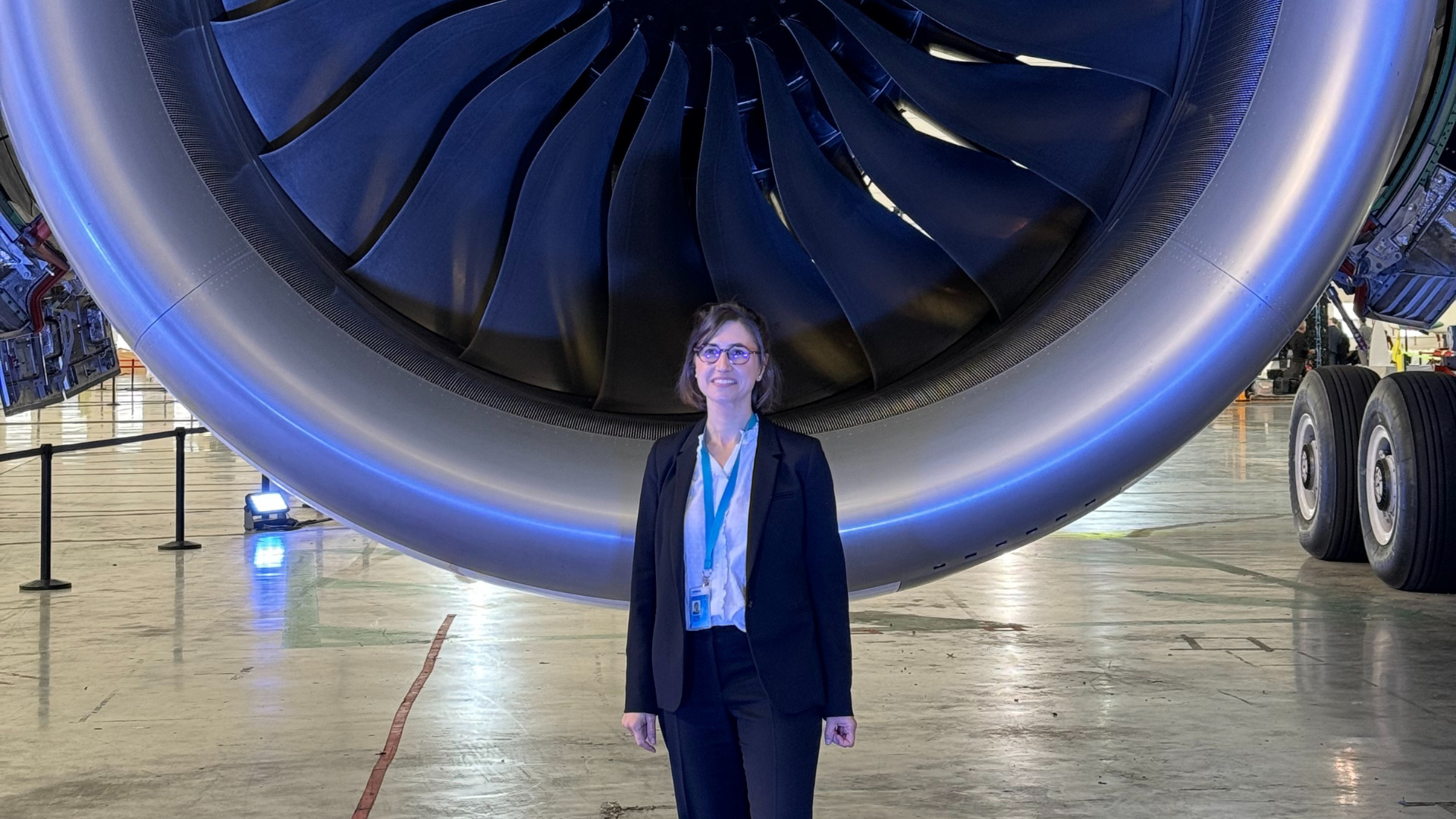
So, you were back to working in communications.
That’s right, but added to this there was also a marketing aspect, as my role is in sales support and promoting our products – for commercial aircraft, defence, helicopters and to a lesser degree space – using communication tools, such as sponsoring, events planning, and publicity campaigns, etc. This position involved me travelling a lot. I would go round the world several times a year, supporting the sales campaigns in the various countries, each with their own products hence subject to a specific communications setup. I remained in this position up until a new redundancy plan resulted in the closure of Airbus in Paris. I was married at this point and pregnant with our first daughter. I did wonder whether to leave Airbus, but wasn’t able to find any available post that interested me. An international dimension was clearly missing, whereas at Airbus, I’m called on to speak four languages (as well as French and English, which are my two mother tongues, I also speak German and Spanish) all in the same day, to colleagues and customers.
So, ultimately, you chose to remain working at Airbus?
It just so happens that the Airbus Communications Board gave me the opportunity to go back to my post in technology and product decarbonisation communication… but the position was now based in Toulouse. After discussing this with my husband, who at this time was a financial director for a branch of Bouygues Télécom, we decided to relocate to The Pink City with our first daughter. He stepped down from his post and I took up my duties in 2018. I was heading up a team of three staff and coordinating the work of twelve others. This job took me full circle back to my initial duties when I first joined Airbus: decarbonisation, innovation, technology, etc. Then it all became clear; this was indeed my dream job. It was as if all the puzzle pieces, the job functions I’d previously held that had enabled me to grasp the workings of a factory, corporate funding, etc., had all fallen into place.
What exactly does your job involve?
Since taking up my role, the job has moved on. Engineering and, more recently, Airbus digitalisation have been added to my remit, as has sustainable development. I work directly with a team of 15 individuals. We are rather like the conductors of an orchestra in terms of communication, we define the strategy to be implemented by the various departments. We head up in-house communications, with a staff of 134,000 employees, and the external communications aimed at, amongst other things, attracting new talents to join the Group. We are also on a mission to influence funding agencies, with a view to them backing our hydrogen-based technologies, thus assisting us in decarbonising our practices. We must act on an entire ecosystem: if we are lacking in available hydrogen or operating with airports unable to accommodate planes powered by this energy, we stand to make no headway. Our role is to engage all stakeholders; it is equally to lobby against regulations currently in force, to include more hydrogen-powered aircraft, par example. We also carry out studies into flying taxis to establish new regulations: how they will be able to fly, how they will be managed, etc. We work directly with the suppliers: communication is a way of negotiating to benefit from innovative technologies at a low cost. Yet, for us, the greatest stake remains the public. We must clean up the image of the aviation industry, which has become a scapegoat for the environmental cause. The sector represents around 2% of CO2 emissions in the world. This percentage has declined by 90% over the past 60 years. And although, in certain cases, the train may be a more attractive alternative – particularly when travelling through France – the plane remains a fundamental mode of transport in terms of how our world operates. It brings people together.
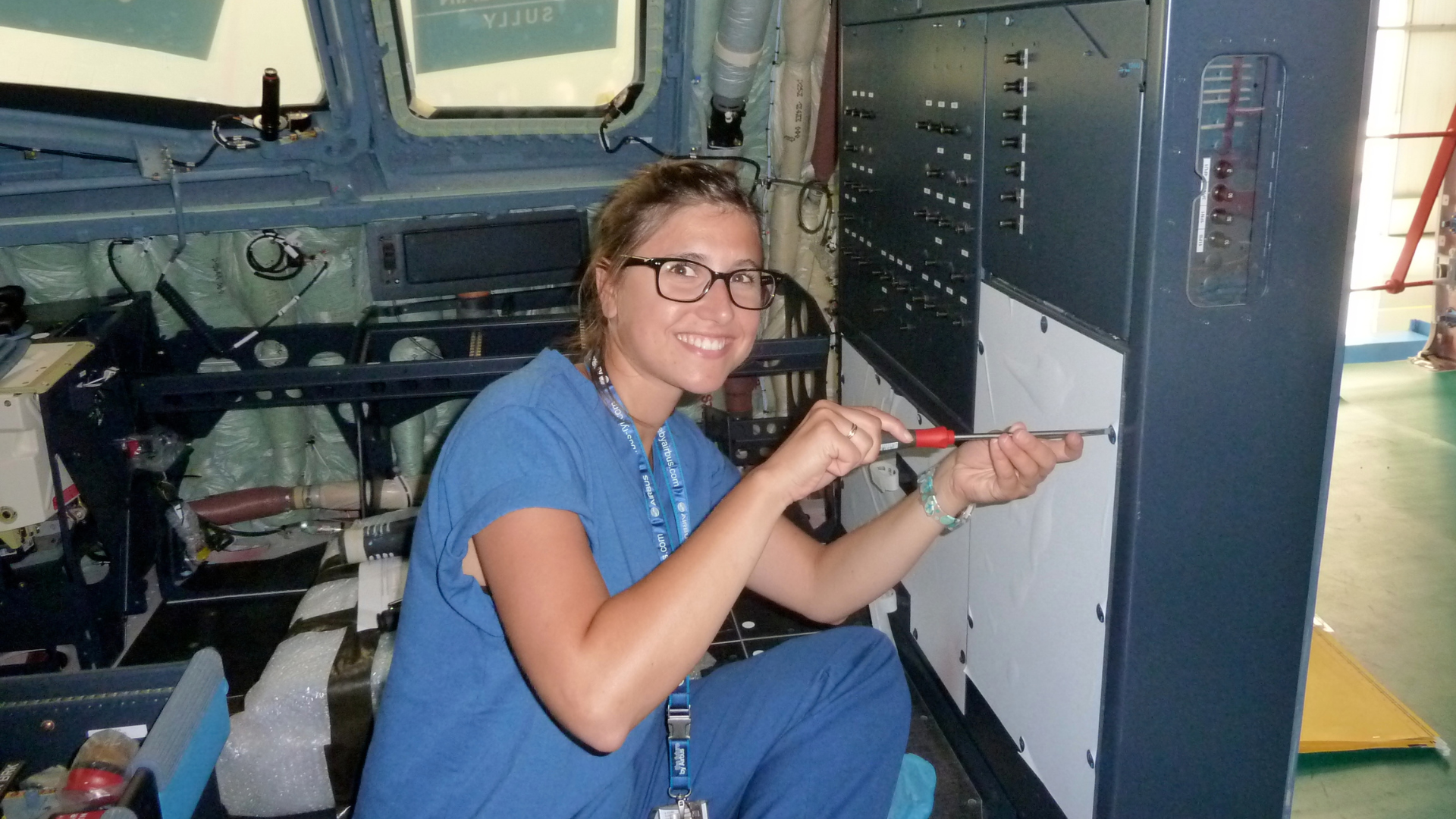
What do you enjoy about travelling?
First and foremost, my mother is English and my father French. Being immersed in this dual-cultural environment from birth fosters a spirit of openness. Then, during my travels, I enjoy confronting my own values, seeing where I stand compared to other cultures, and discovering how other nationalities think and operate.
Travel enables you to question yourself, have a deeper understanding of who you are, and get to know yourself better. I also do a lot of hiking. These moments allow you to be alone with yourself, and get back in touch with who you are, in settings where you can get back to nature, for we are the ones who need to adapt. There is also a contemplative dimension to this: feeling the sun on your skin, the wind, etc. It is pleasant to ground yourself in the present moment. In the mountains, you feel very small, like you belong to something greater than yourself. When you work a lot, this helps keep things in perspective. Then there are the beautiful landscapes which help bring me a real sense of calm.
How do you release the pressure?
I meditate. Having a position of responsibility requires a lot of energy. This helps me recharge, reconnect with myself, and master my emotions. Prior to an important event or when managing a critical situation, I do breathing exercises, sophrology, etc. This allows me to recharge my energy, as does walking. What’s more, I do a lot of sport on a daily basis, by cycling from place to place. Family life is also a great way to recharge your batteries.
You have two daughters. What values would you like to pass on to them?
To be curious and have a desire to learn new things. It is important to remain open to the world and to others and embrace their differences, without being judgemental. In my eyes, benevolence is a fundamental value.
I did some voluntary work for an association helping refugees to integrate society (I have taken several of them on during internships at Airbus for example). One day, I took one of my daughters along with me, so that she could see people from outside her family and our circle of friends. It is important not to be afraid of speaking to people who are different, and to welcome them with an open mind.
What are the takeaways from this journey of yours?
It’s the importance of knowing yourself, for instance identifying what enables us to protect and restore our energy. At Audencia, we had access to personality tests indicating what we liked and didn’t like to do, the work environment best suited to our needs, as well as the different sides to our personality, etc. This proved very useful to me. Then, it is necessary to make the most of each of these experiences and give the best of yourself, for what you learn will prove useful for the future. At the same time, doing the things you love and doing them well enables you to progress and continue to grow. The more you move forward in your career, the more you refine the mark you wish to leave on the company.
Today, what makes you most proud?
What I am most proud of is all we have accomplished over recent years with the team. We have managed to impact the aviation sector on decarbonisation; we are trailblazers in this field and our practices have been replicated by other actors. This is just the beginning… Yet, we have taken things forward. I could remain at Airbus all my life, changing divisions every once in a while. However, as I have always done, I leave the door open to other opportunities, provided they prove meaningful to me and allow me to keep moving forward.
What message would you like to give to your younger self?
To make the most of every moment, not seeking to grow up too fast or copy those around her. As a child, I would tell myself a lot of stories, I had imaginary friends, etc. I have two elder sisters and I wanted to be as big as they were, to the point of giving up on the activities I loved, which they had no interest in. So, today, I would say this to the little girl I once was: keep dreaming, it really doesn’t matter!
